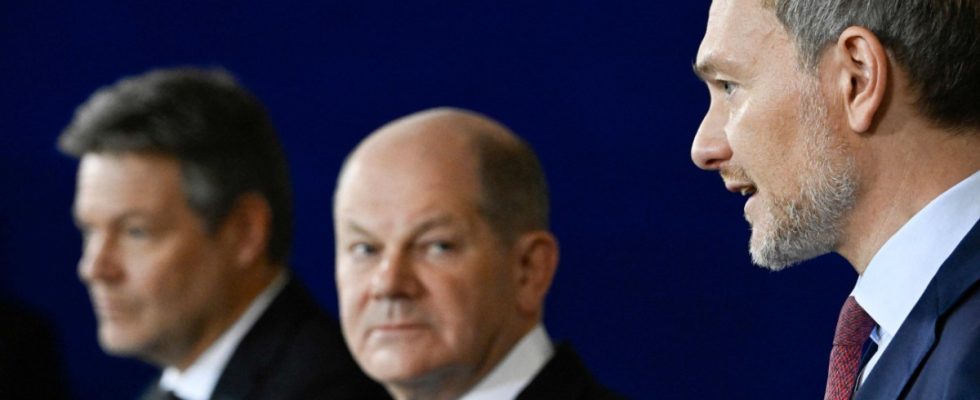In the end everything suddenly happened very quickly, as if the miserable previous story had never happened. At around half past seven on Thursday evening, the news agencies sent out the first breaking news that the federal budget for the current year 2024 was finally in place. The budget that plunged the traffic light coalition into crisis after the Federal Constitutional Court’s disastrous financial ruling in November, pushed the Chancellor’s popularity ratings into the frost zone and drove the farmers onto the streets.
Now the Bundestag’s Budget Committee only had a relatively short meeting to finalize the final details. In previous cases, the so-called cleanup meeting often lasted until the early hours of the morning.
The fact that no night meeting was necessary this time was also due to the fact that in the end the coalition’s austerity constraints were not as great as initially assumed. This was mainly due to the fact that the federal government unexpectedly ended 2023 with a budget surplus of 6.3 billion euros. This money can now be spent in 2024, among other things to repair the flood damage on the Ahr.
The permitted net borrowing is completely exhausted at 39 billion
Contrary to the original plan, the SPD, Greens and FDP are also refraining from collecting around 5.2 billion euros from the Federal Employment Agency by 2027 that the authority had received in state subsidies during the corona pandemic. Critics had described the cuts plans as illegal. However, there were no further concessions to the farmers, who had swept the country with a wave of protests in recent weeks. Rather, it remains the case that the subsidies for so-called agricultural diesel will be gradually reduced.
The bottom line is that the federal government can now spend almost 477 billion euros this year, around 19 billion more than in 2023. Of the total, 70.5 billion euros are considered investments, which also include increasing Deutsche Bahn’s equity capital and loans in the amount of twelve billion euros can be counted towards building up a capital stock for the new stock pension. Both projects are not counted towards the debt brake because they are considered so-called financial transactions that have a concrete value.
The scope for new debts permitted under the Basic Law increased by almost 17 billion euros to the maximum permissible net borrowing of 39 billion euros, which should also be fully utilized. If the federal government gets by with this, it would be able to comply with the debt brake anchored in the Basic Law for the first time after four exceptional years in a row caused by the pandemic and war. The Bundestag wants to pass the budget on February 2nd.
According to the SPD and the Greens, Lindner pushed for unpopular decisions
The committee’s budget discussions were originally scheduled to end in mid-November. Immediately before the planned adjustment meeting, the Federal Constitutional Court canceled the government’s 60 billion euros in Corona loans that the traffic light coalition had unconstitutionally transferred to the so-called Climate and Transformation Fund (KTF) in order to be able to promote the country’s switch to renewable energies.
Lindner therefore had to replan the budget for 2024 and close a gap that he had initially estimated at 17 billion euros. After much wrangling, the coalition finally agreed shortly before Christmas on a package of measures that included, among other things, higher eco-taxes for airlines as well as savings in citizens’ money and for farmers.
The fact that in the end not that much had to be cut caused criticism of Lindner from the SPD and the Greens on Thursday. It was said behind closed doors that this had created unnecessary pressure to save money and pushed the coalition to make unpopular decisions. The German Farmers’ Association, for example, has announced further demonstrations for next week, even though the government has long since withdrawn its austerity measures to the detriment of agriculture.
An additional billion euros is available for rental housing construction
The Budget Committee also made further changes to the government’s submission. At the request of the coalition factions, the planned stricter sanctions for so-called total objectors were limited to two years. Building Minister Klara Geywitz (SPD) promised MPs an additional billion euros to support the construction of small, energy-efficient and affordable rental apartments. The largest single budget, at more than 170 billion euros, remains the budget of Labor Minister Hubertus Heil (SPD), who, however, has to pass on the majority of the money as a subsidy to the statutory pension insurance.
The budget spokespersons for the SPD, Greens and FDP, Dennis Rohde, Sven-Christian Kindler and Otto Fricke, were satisfied with the results after the adjustment meeting. “As coalition factions, despite different perspectives, against the background of multiple crises and despite a difficult initial situation in these parliamentary deliberations following the Federal Constitutional Court ruling, we are drawing up a balanced budget,” the MPs said in a joint statement. The clear focus would be on social justice, economic incentives, investments in climate protection, strengthening democracy and international cohesion. At the same time, subsidies would be reduced.
The CDU/CSU chief budget officer Christian Haase spoke of a “small happy ending after a chaotic process”. The coalition is doing too little for internal and external security and to stimulate the economy. But it is good that there is no emergency resolution and therefore no exceptions to the debt brake.
The Left, on the other hand, sharply criticized the committee decisions. “It is an anti-social and unfair budget cuts without foresight,” said party leader Janine Wissler. Among other things, she referred to the sanctions for those receiving citizens’ benefits, criticized the lack of climate money and complained about cuts in humanitarian aid and climate protection.

